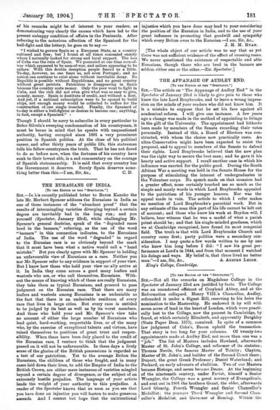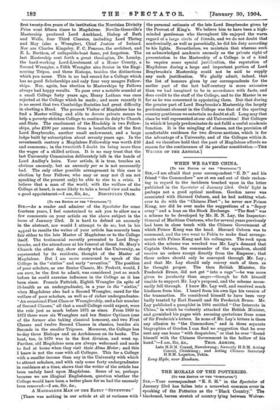[To THE EDITOR. OP THE "SPECTATOR."]
SIR,—Not all the remarks on Magdalene College in the Spectator of January 23rd are justified by facts. The College was an unendowed offshoot of Croyland Abbey, and at the Reformation collapsed. Henry V111.s Chancellor, Audley, refounded it under a Signet Bill, reserving to his heirs the nomination to the Mastership. He endowed it by will with seven acres of land in the heart of London, which were practi- cally lost to the College, now the poorest in Cambridge, by fraud, at which certainly Elizabeth, and apparently Burghley (State Paper Dom. 1575), connived. In spite of a common law judgment of Coke's, Bacon upheld the transaction. That story is too long for your columns. Of twenty-two appointments made at Audley End, not more than one was a "job." The list of Masters includes Howland, afterwards Master of St. John's College, and reformer of its statutes ; Thomas Nevile, the famous Master of Tiinity ; Clayton, Master of St. John's, and builder of the Second Court there ; Duport, the great Greek Professor ; Daniel Waterland; and Peckard, an early advocate of abolition. Two of our Masters became Bishops, and seven became Deans. At the beginning of the nineteenth century, under Farish, himself a Senior Wrangler, the College was a great nursery of Evangelicals, and sent out in 1801 the brothers Grant, the elder, afterwards Lord Glenelg, Fourth Wrangler and Senior Chancellor's Medallist: the young,er Third Wrangler and Second Chan- cellor's 3Iedaliist, and Goveinor of Bombay. Within the first twenty-five years of its institution the Norrisian Divinity Prize went fifteen times to Magdalene. Neville-Grenville's Mastership produced Lord Auckland, Bishop of Bath and Wells, four Third Classics, including Lord Thring and May (also a Wrangler), Chief Justice of Ireland. Nor are Charles Kingsley, F. C. Penrose, the architect, and E. L. Berthon, of collapsible-boat fame, yet forgotten. The last Mastership sent forth a great theologian, Dr. Lumby, the hard-working Lord-Lieutenant of a Home County, a Second Wrangler, a Fifth Wrangler also Senior in the Engi- neering Tripos, and three Bishops, besides the distinctions which you name. This is no bad record for a College which has no good Scholarships and only four very meagre Fellow- ships. Nor, again, has election to Masterships by Fellows always bad happy results. To pass over a notable scandal at a small College forty years ago, Henry Latham was once rejected at the College which he made ; and more recently it is no secret that two Cambridge Societies had great difficulty in electing a Head. The present Visitor of Magdalene has to find a Master willing and able to devote private means to help a poverty-stricken College to continue its duty to Church and State. The emolument of the Headship is two Fellow- ships, plus 2100 per annum from a benefaction of the first Lord Braybrooke, another small endowment, and a large lodge built by subscription about seventy years ago. In the seventeenth century a Magdalene Fellowship was worth 240 and commons ; in the twentieth I doubt its being more than the wages of a skilled artisan. It is no easy trust that the last University Commission deliberately left in the hands of Lord Audley's heirs. Your article, it is true, touches an obvious anomaly, but an anomaly per se is not necessarily bad. The only other possible arrangement in this case is election by four Fellows, who may or may not (I am not speaking of the present only) be able to rise to a crisis. I believe that a man of the world, with the welfare of the College at heart, is more likely to take a broad view and make
a good appointment.—I am, Sir, &c., DISCIPULIIS OLDS.























































 Previous page
Previous page